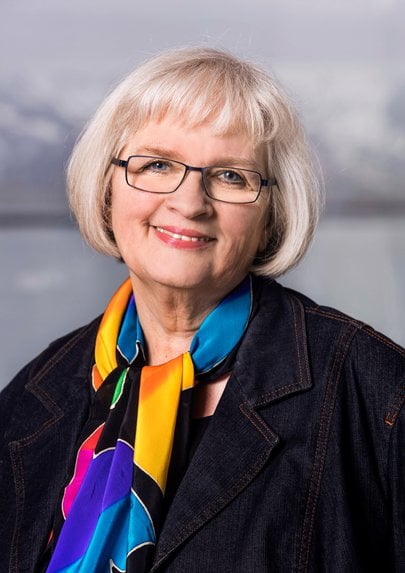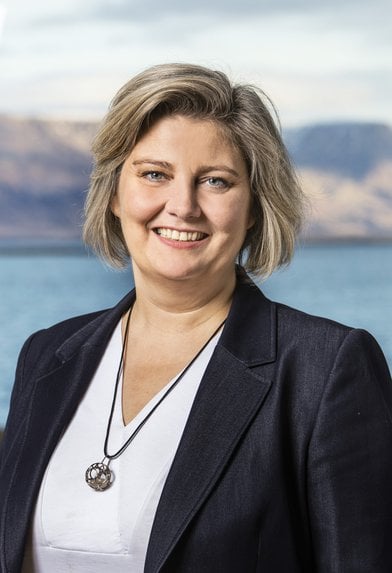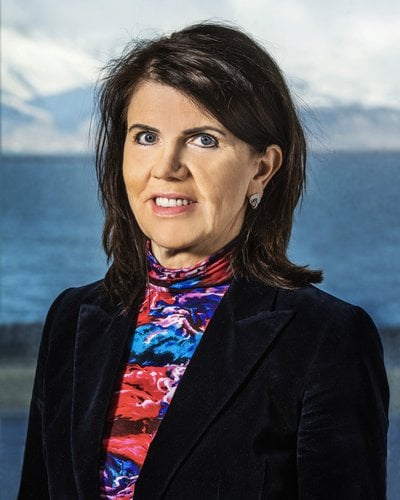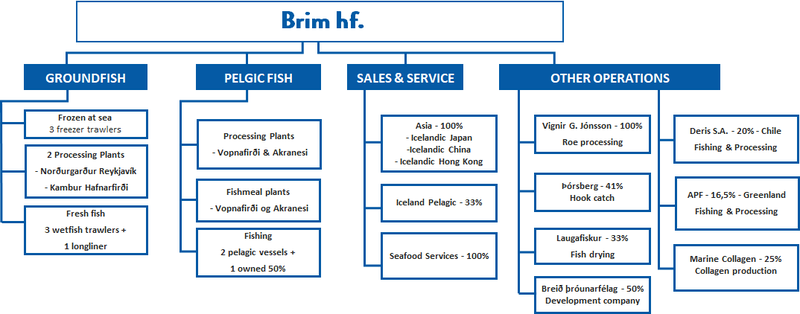BOARD OF DIRECTORS
Kristján Þórarinn Davíðsson
Chairman of the Board
Education:
Fisheries Resource Management M.Sc. from the University of Fisheries in Tromsø, Norway. Level I Ship Captain from the Icelandic Naval Academy. The Financial Supervisory Authority's examination for directors of financial firms and courses at Reykjavík University and Bedriftsökonomisk Institutt (BI) in Oslo, Norway, in board positions.
First Elected to the Board of Brim hf:
March 2019
Experience:
Manages his own consulting and investment company Viðskiptaþróun ehf., as well as the investment company ISDER ehf. Has over three decades of experience in the international fisheries sector, following the conclusion of his studies, including marketing and sales, finance, business operations, and management at Norfish Export Co., SIF, Marel, Íslandsbanki/Glitnir, Grandi/HB Grandi, and Iceland Seafood International.
Other Board Positions:
Has served as a board member of companies in Norway, Peru, Chile, and Iceland for many years, including Landsbankinn, Corporacion Pesquera Inca, Pesquera Friosur, and Vaka. Currently, the chairman of the board of Valka and Snerpa, board member of Olivita, Sjótækni, Hamravík, and Polar Togbúnaður, deputy member of the board of Almenni Lífeyrissjóðurinn.
Ownership Interest in Brim hf.:
ISK 0 (0.00%)
Conflict of Interest:
No conflict of interest, neither with the company's primary business partners, nor its competitors or shareholders with more than a 10% stake in the company.

Anna G. Sverrisdóttir
Board Member
Education:
Diploma studies at the Ökonomisk Faghögskole in Trondheim (now part of the Norges Teknisk Naturvitenskapelige Universitet in Trondheim-NTNU), with an emphasis on auditing and human resources, and attended the Iceland School of Commerce prior to that.
First Elected to the Board of Brim hf:
April 28, 2016
Experience:
As a self-employed consultant through AGMOS ehf., she managed specific projects for the Icelandic Tourism Association (SAF). Varied enterprise-level experiences. Has mainly worked in finance and management, for example at the following companies: Bláa Lónið, Laugarvatn Fontana, Viðskiptablaðið, Vaka-Helgafell, Íslenska útvarpsfélagið (Stöð 2), and Arnarflug, in addition to having worked at the Accounting Firm of Björn and Ari (has since merged with Deloitte), the fisheries company Hilmir sf., and Landsbankinn.
Other Board Positions:
Board seats: Bláa Lónið hf., Hreyfing ehf., AGMOS ehf. Previous board positions in the following companies and institutions: Into the Glacier ehf, Lífeyrissjóður verzlunarmanna, Framkvæmdasjóður ferðamannastaða, Útflutningsráð, Ferðamálaráð, Samtök ferðaþjónustunnar, and Arnarflug hf. Has, additionally, taken a very active role in several NGOs. Has also served on various committees for the Ministries of Industry, Foreign Affairs, Transport and the Environment.
Ownership Interest in Brim hf.:
ISK 0 (0.00%)
Conflict of Interest:
No conflict of interest, neither with the company's primary business partners, nor its competitors or shareholders with more than a 10% stake in the company.

Guðmundur Kristjánsson
Board Member
Education:
Business and Marketing from Salem State College, Salem Massachusetts, USA.
Fishing technician from Tækniskóli Íslands 1983.
First Elected to the Board of Brim hf:
May 1, 2018
Experience:
Serves as the CEO of Brim hf. Formerly the managing director of the fishing company Tjaldur ehf., and is the managing director of Kristján Guðmundsson hf. in Rif.
Other Board Positions:
Serves on the boards of Brims' sales companies in Asia and fisheries companies in Greenland, as well as other smaller companies in Iceland. Has served on the board of the National Association of Icelandic Fishermen (LÍÚ) from 1991 to 2014, also served on the boards of the Icelandic School of Navigation (Sjómannaskólinn), the Technical College (Tækniskólinn), Hjallastefnan, Icelandic Group (Sölumiðstöð hraðfrystihúsanna), the Akureyri Fisheries Company (Útgerðarfélag Akureyringa), the Trade Council of Iceland, Búnaðarbankinn, Straumur Investment Bank, the fish processing plant in Vestmannaeyjar, UR Seafood (Útgerðarfélag Reykjavíkur), the fish processing plant KG in Rif, Bakki in Bolungarvík, Básafell in Ísafjörður, the fish processing plant Kambur in Flateyri, the fish processing plant Íslandssaga in Suðureyri, and the fish drying plant Laugafiskur in Laugar.
Ownership Interest in Brim hf.:
ISK 0 (0.00%)
Conflict of Interest:
Owner of Útgerðarfélag Reykjavíkur (UR Seafood), which, along with its subsidiary, owns 859,870,977 shares in Brimi hf.

Kristrún Heimisdóttir
Board Member
Lawyer, cand.jur. from the University of Iceland. Law and philosophy studies at KU Leuven Belgium and at UCC Cork in Ireland. Doctoral studies in the United States.
First Elected to the Board of Brim hf:
July 27, 2018.
Experience:
Self-employed consultant. Research Fellow at Columbia University Law School in New York since 2015. Executive Director of the Federation of Icelandic Industries 2013-2014. Lecturer at the University of Akureyri since 2012, currently a guest lecturer there. Assistant to the Minister of Economic Affairs 2010-2012. Legal Adviser to the Minister of Welfare 2009-2010. Assistant to the Minister of Foreign Affairs 2007-2009. LEX law firm 2006-2007. Lawyer for the Federation of Icelandic Industries 2002-2006. Selection committee for the winning proposal in the competition for the construction of a music hall in Reykjavík 2005-2006. Taught at Reykjavík University and Bifröst University. Managing Director of the Reykjavík Academy. Lawyer at the Parliamentary Ombudsman. Sports reporter, etc. at RÚV. One of the authors of a report for a working group on EEA co-operation for 2019. Worked with Thorvald Stoltenberg, on Iceland’s behalf, in the committee for the Nordic Defense Cooperation in 2008. Served in the Constitution Committee 2005-2007.
Other Board Positions:
Part of the University Council of the University of Iceland. On the board of the "Leifur Eiríksson Foundation". Alternate member of the Board of the Icelandic State Financial Investments (ISFI). In the ethics committee for the Icelandic Football Association. Alternate member of the board of the Association of Depositors. Examples of previous board positions: Chairman of the Board of the Business Innovation Fund. Chairman of the Church Social Services Board. Secretary of the Board of the Sports and Olympic Association. Chairman of an Achievement Fund. On the board of Reykjavík University. Cooperation Platform for Fisheries and Industry. The Chairman of the Board of Hlaðvarpinn ehf.
Ownership Interest in Brim hf.:
ISK 0 (0.00%)
Conflict of Interest:
No conflict of interest, neither with the company's primary business partners, nor its competitors or shareholders with more than a 10% stake in the company.

Magnús Gústafsson
Board Member
Education:
Operations Engineer from Odense Teknikum, Optimization Studies.
First Elected to the Board of Brim hf:
May 1, 2018.
Experience:
CEO of Atlantika INC in the United States, 2009-2018. Iceland's Consul General in New York, 2005-2008. CEO of Icelandic Inc - Coldwater Seafood, 1984-2005. CEO of Hampiðjan hf., 1972-1984. Optimization consultant at the Icelandic Confederation of Employers (Vinnuveitendasamband Íslands), 1966-1972.
Other Board Positions:
Served on the board of Brim hf. (currently UR Seafood hf.), served on the board of Promens.
Ownership Interest in Brim hf.:
ISK 81,689 (0.005%)
Conflict of Interest:
No conflict of interest, neither with the company's primary business partners, nor its competitors or shareholders with more than a 10% stake in the company.




